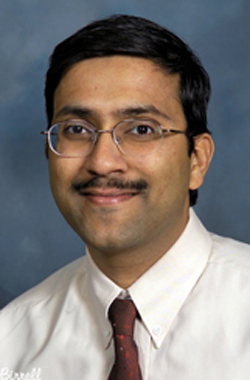 |
Apar Ganti, M.D. |
UNMC’s lung cancer research program is growing.
A decade ago there were clinical trials for lung cancer patients at UNMC, but the research enterprise was not what it could have been.
“Today,” said Apar Ganti, M.D., associate professor of internal medicine, oncology and hematology, “although not where we would like to be yet, we have a number of researchers across the campus who are engaged in lung cancer research that encompasses the spectrum, including basic science, translational research, clinical research and patient-based research.”
Some areas of emphasis include:
- Clinical research which has included extensive publication on outcomes from lung cancer in older patients and those who cannot tolerate standard therapy, led by Dr. Ganti and Anne Kessinger, M.D., professor of oncology and hematology.
- A grant from the Affordable Care Act-devised Patient-Centered Outcomes Research Institute that focuses on patient satisfaction from chemotherapy in stage four lung cancers. Research will help patients and medical practitioners make better decisions on treatment options. Monirul Islam, M.D., Ph.D., assistant professor of epidemiology in the College of Public Health, serves as principal investigator.
- Research on MUC4 and other mucins and their roles in early-stage lung cancer by Dr. Ganti and Surinder Batra, M.D., professor and chairman, department of biochemistry and molecular biology. Some promising preliminary research has been published in the April 2013 Journal of Thoracic Oncology. This work is supported by a Career Development Grant to Dr. Ganti from the Department of Veterans Affairs.
- Karin Trujillo, M.D., assistant professor of cardiovascular and thoracic surgery, is leading the effort to develop a lung cancer registry, tumor bank and tumor registry.
- Similarly, there is a movement towards developing a lung cancer screening program at UNMC. This effort is being spearheaded by Rudy Lackner, M.D., professor of cardiovascular and thoracic surgery.
- The Batra and Ganti labs are currently developing new spontaneous animal models for lung cancer.